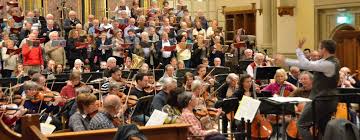Tonbridge School Chapel, Saturday 24 November 2018
Commemorating the centenary of the First World War has given rise to a wide range of events, but Britten’s War Requiem has been foremost amongst them. Tonbridge Philharmonic, under Matthew Willis, drew on strong forces to bring us a moving and at times challenging reading of the work within the often difficult acoustic of Tonbridge School Chapel. The layout is not conducive to concerts as the audience is essentially facing itself rather than the performers and the sound tends to remain at the east end. Only in the magnificent outpouring of the brass at its most triumphant or the hushed singing of the girls’ choir in the west balcony did the whole space really come alive.
Britten’s demands are difficult for any group to bring fully to fruition today. We had the benefit of the distant girls’ choir and the movement of the solo singers, but there was no real differentiation between the full and chamber orchestras, nor the second conductor as Britten required.
Many key moments flowered impressively. The Kyrie was precise and accurate, the Sanctus built to a thrilling climax and the Lacrimosa blossomed beautifully. The three young soloists were able to ride the large orchestra though their diction was often lost within the acoustic. The best moments came in the more reflective sections. Tenor Bradley Smith was movingly effective in Move him into the sun and bass-baritone Tristan Hambleton sympathetic in the final pages. Soprano Sofia Troncoso has the more difficult task as Britten needs a remarkably large voice to ride the emotional intensity of the orchestration. She seemed to grow in strength as the work progressed, producing ever more beautiful tone.
The choral forces produced strong tonal colour and some incisive rhythms but as with the soloists the text tended to get lost as soon as the volume increased. The girls’ choir in the gallery had the better deal as they were not required to fight with larger forces and impressed throughout.
The evening opened with an introductory talk from Barry Holden and a reading of a few of Wilfred Owen’s poems. We also had strict instructions not to applaud at any point. Given the venue this seemed to be attempting to turn the event into something more than a concert. This would not be a problem if clearly indicated beforehand but might have confused some of the audience. When Britten’s instructions on the way to perform the work are ignored, it is unclear why picking this one demand should be so crucial. Thanking the performers is normally a natural reaction not an expectation and it seemed strange not to be allowed to thank those involved.

